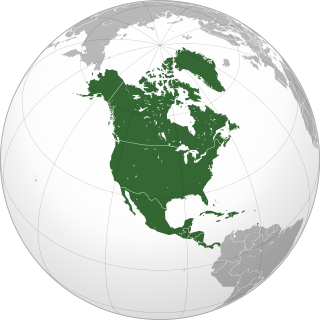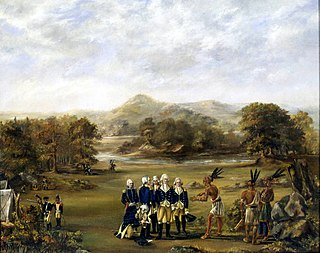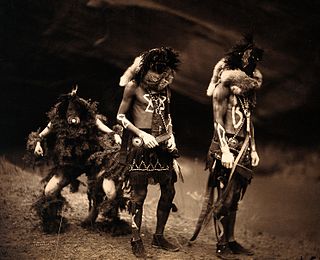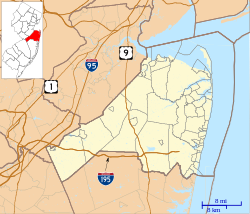
Hawaii is a U.S. state located in the Pacific Ocean. It is the only state outside North America, the only island state, and the only state in the tropics. Hawaii is also one of a handful of U.S. states to have once been an independent nation.

North America is a continent entirely within the Northern Hemisphere and almost all within the Western Hemisphere. It can also be described as a northern subcontinent of the Americas. It is bordered to the north by the Arctic Ocean, to the east by the Atlantic Ocean, to the southeast by South America and the Caribbean Sea, and to the west and south by the Pacific Ocean. However, Greenland, because it is on the North American Tectonic Plate, is often included as part of North America geographically.

Native Americans, also known as American Indians, First Americans, Indigenous Americans and other terms, are the indigenous peoples of the United States, sometimes including Hawaii and territories of the United States and sometimes limited to the mainland. There are 574 federally recognized tribes living within the US, about half of which are associated with Indian reservations. "Native Americans" are Indigenous tribes that are originally from the continental United States, plus Alaska Natives.

Oklahoma is a state in the South Central region of the United States, bordered by the state of Texas on the south and west, Kansas on the north, Missouri on the northeast, Arkansas on the east, New Mexico on the west, and Colorado on the northwest. Partially in the western extreme of the Upland South, it is the 20th-most extensive and the 28th-most populous of the 50 United States. Its residents are known as Oklahomans, and its capital and largest city is Oklahoma City.

The War of 1812 was a conflict fought between the United States and its allies, and the United Kingdom of Great Britain and Ireland and its dependent colonies in North America and indigenous allies. It began when the United States declared war in June 1812, and ended in a restoration of the pre-war status quo when a peace treaty agreed to earlier was ratified by the United States in February 1815. Historians in the United Kingdom often see it as a minor theatre of the Napoleonic Wars, while historians in North America see it as a war in its own right; it is related to the American Indian Wars, Sixty Years' War, Creek War, Tecumseh's War, and the American Revolutionary War.

Although the United States does not have an official language, the most commonly used language is English, which is the de facto national language. Many other languages are also spoken in the United States, especially Spanish. These include indigenous languages, languages brought to the country by colonists, enslaved people and immigrants from Europe, Africa and Asia. There are also several languages, including creoles and sign languages, that developed in the United States. Approximately 430 languages are spoken or signed by the population, of which 176 are indigenous to the area. Fifty-two languages formerly spoken in the country's territory are now extinct.

The term "Five Civilized Tribes" derives from the colonial and early federal period in the history of the United States. It refers to five Native American nations—the Cherokee, Chickasaw, Choctaw, Creek (Muscogee), and Seminole. These are the first five tribes that European Americans generally considered to be "civilized". Examples of colonial attributes adopted by these five tribes, which led European Americans to label them civilized, include Christianity, centralized governments, literacy in English, market participation, written constitutions, intermarriage with white Americans, and plantation slavery practices. The Five Civilized Tribes tended to maintain stable political relations with the European Americans.
Over two billion people speak English, making English the largest language by number of speakers, and the third largest language by number of native speakers. The United Kingdom and the United States with 67 million and 330 million respectively, have the most native speakers. Additionally, there are 29 million in Canada, 25.7 million in Australia, 5 million in New Zealand, and 5 million in Ireland.

An Indian reservation is a legal designation for an area of land managed by a federally recognized Native American tribe under the U.S. Bureau of Indian Affairs rather than the state governments of the United States in which they are physically located. Each of the 326 Indian reservations in the United States is associated with a particular Native American nation. Not all of the country's 574 federally recognized tribes have a reservation—some tribes have more than one reservation, while some share reservations, and others have no reservations at all. In addition, because of past land allotments, leading to some sales to non–Native Americans, some reservations are severely fragmented, with each piece of tribal, individual, and privately held land being a separate enclave. This jumble of private and public real estate creates significant administrative, political, and legal difficulties.

The Northwest Indian War (1785–1795), also known as the Ohio War, Little Turtle's War, and by other names, was a war between the United States and the Western Confederacy, with support from the British, for control of the Northwest Territory. It followed centuries of conflict over this territory, first among Native American tribes, and then with the added shifting alliances among the tribes and the European powers of France and Great Britain, and their colonials. The United States Army considers it their first of the United States Indian Wars.

The indigenous peoples of the Americas are the pre-Columbian peoples of North, Central and South America and their descendants.
Race and ethnicity in the United States is a complex topic because the United States of America has a racially and ethnically diverse population. At the federal level, race and ethnicity have been categorized separately.

The United States of America (USA), commonly known as the United States, or America, is a country primarily located in North America, consisting of 50 states, a federal district, five major self-governing territories, and various possessions. At 3.8 million square miles, it is the world's third- or fourth-largest country by total area. With a population of more than 328 million people, it is the third most populous country in the world. The national capital is Washington, D.C., and the most populous city is New York City.

The overthrow of the Hawaiian Kingdom began on January 17, 1893, with a coup d'état against Queen Liliʻuokalani on the island of Oahu by subjects of the Hawaiian Kingdom, United States citizens, and foreign residents residing in Honolulu. A majority of the insurgents were foreigners. They prevailed upon American minister John L. Stevens to call in the U.S. Marines to protect United States interests, an action that effectively buttressed the rebellion. The revolutionaries established the Republic of Hawaii, but their ultimate goal was the annexation of the islands to the United States, which occurred in 1898.

Native American religions are the spiritual practices of the indigenous peoples of North America. Ceremonial ways can vary widely and are based on the differing histories and beliefs of individual tribes, clans, and bands. Early European explorers describe individual Native American tribes and even small bands as each having their own religious practices. Theology may be monotheistic, polytheistic, henotheistic, animistic, shamanistic, pantheistic or any combination thereof, among others. Traditional beliefs are usually passed down in the forms of oral histories, stories, allegories, and principles.
Native American civil rights are the civil rights of Native Americans in the United States. Native Americans are citizens of their respective Native nations as well as the United States, and those nations are characterized under the Law of the United States as "domestic dependent nations", a special relationship that creates a particular tension between rights retained via tribal sovereignty and rights that individual Natives obtained as U.S. citizens. This status creates tension today, but was far more extreme before Native people were uniformly granted U.S. citizenship in 1924. Assorted laws and policies of the United States government, some tracing to the pre-Revolutionary colonial period, denied basic human rights—particularly in the areas of cultural expression and travel—to indigenous people.

Americans are nationals and citizens of the United States of America. Although nationals and citizens make up the majority of Americans, many dual citizens, expatriates, and permanent residents may also claim American nationality. The United States is home to people of many ethnic origins. As a result, American culture and law does not equate nationality with race or ethnicity, but with citizenship and permanent allegiance.
American(s) may refer to:

The history of Native Americans in the United States began in ancient times tens of thousands of years ago with the settlement of the Americas by the Paleo-Indians. Anthropologists and archeologists have identified and studied a wide variety of cultures that existed during this era. Their subsequent contact with Europeans had a profound impact on the history of their people.

The California genocide consisted of actions taken by the United States in the 19th century, following the American Conquest of California from Mexico, that resulted in the dramatic decrease of the indigenous population of California. Between 1849 and 1870 it is conservatively estimated that American colonists murdered some 9,500 California Natives, and acts of enslavement, kidnapping, rape, child separation and displacement were widespread, encouraged, carried out by and tolerated by state authorities and militias.


















